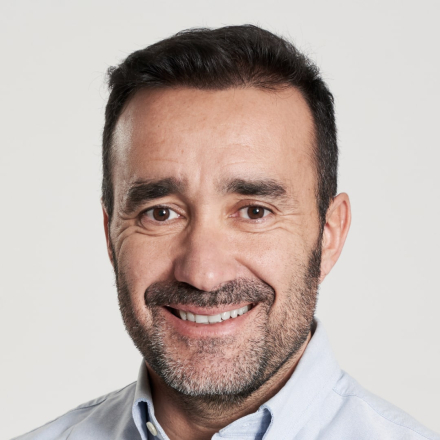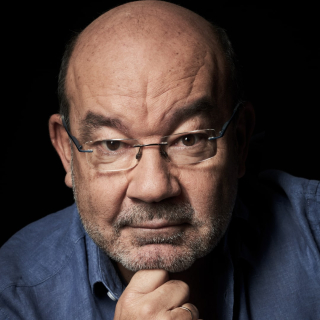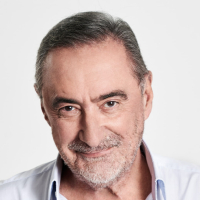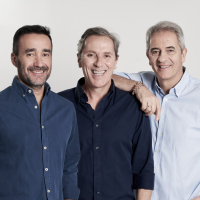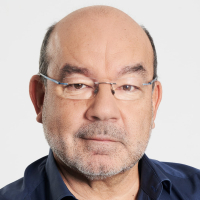Pope Francis after his operation: "It never crossed my mind to resign"
The Holy Father is interviewed by Carlos Herrera in COPE. For the first time he talks about his medical intervention and for the first time in history he speaks on a Spanish radio
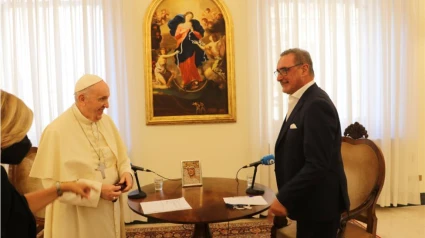
Pope Francis after his operation: "It never crossed my mind to resign"
Madrid - Publicado el - Actualizado
20 min lectura
At dinnertime, on the last weekend of August, with 'his' Virgen de la Candelaria under his arm and more than ten pages of questions and notes. This is how Carlos Herrera arrived at the Vatican's Santa Marta residence to interview Pope Francis and write this Wednesday, September 1, 2021, a new chapter in the history of Spanish radio, with which the highest rated communicator of the radio has kicked off the new season of 'Herrera en COPE'.
This is the only interview granted by the Holy Father to a Spanish radio station and the first after he underwent surgery in July for diverticular stenosis: "I'm still alive", Francis laughingly replied to Carlos Herrera, who opened the conversation by asking him precisely about his health.
The Argentine pontiff even offered during the interview with the Andalusian communicator some details regarding the operation, in which a nurse from the health service of the Holy See was the protagonist to the point of pushing him to make a decision contrary to the criteria of some, as revealed by Francis himself: "He saved my life! He told me: 'You have to undergo surgery'. There were other opinions: 'Better with antibiotics...". But the explanation given by this doctor with more than 30 years of experience was key: the surgery detected that there was a necrotic section and, as Pope Francis reveals for the first time, now "he has 33 centimeters less intestine".
In this regard, the Holy Father said that, almost two months after the intervention, he leads a "totally normal" life, can "eat everything" and maintain his extensive agenda: "Today all morning in audiences, the whole morning," he stressed. An agenda which, as Carlos Herrera recalled, will take Francis on a trip to Slovakia and Hungary this September, the 34th of his Pontificate.
Despite his good appearance, speculations about his health condition have led certain Italian and Argentinean media to talk about a possible resignation. Questioned about it, the Pope has taken the matter down, taking it with that Argentine sense of humor that characterizes him. And, moreover, he categorically denied it: "It never crossed my mind", "I don't know where they got it from that I was going to resign!
Eva Fernández, COPE's correspondent in the Vatican and Italy, told him about the “quilombo”, the mess that had arisen: “Eva told me that; she even said it with a very nice Argentine expression, and I told her that I had no idea because I read only one newspaper here in the morning, the newspaper of Rome. I read it because I like the way of its headline, I read it quickly and that's it, I don't get into the game. I don't watch television. And I do receive the report about some of the news of the day, but I came to know about that much later, a few days later, that there was something about me resigning. Whenever a Pope is ill, there is always a breeze or a hurricane of conclave”, he replied with a laugh.
The political situation in Afghanistan
The crisis in Afghanistan is one of the main issues discussed in the interview. Without wishing to give details of the evacuations and the steps being taken there by the Holy See, Pope Francis praised the diplomatic role being played in this conflict by the Vatican Secretariat of State, headed by Cardinal Pietro Parolin: "I am sure that he is helping or, at least, offering to do so"; "Cardinal Parolin is really the best diplomat I have ever met".
However, he considers this to be a difficult situation, for which he calls for a special form of prayer: “I am going to try to ask for what the Church always asks for in times of great difficulty and crisis: more prayer and fasting. Prayer, penance and fasting, which is what is asked for in moments of crisis”.
In the Holy Father's opinion, the fact that the West is putting an end to twenty years of occupation of the territory is "licit", although "the echo it has in me is something else". Regarding the concept of "leaving the Afghan population to their fate", the Pope clarified that the crux of the matter is "how to renounce, how to negotiate a way out. As far as we can see, not all eventualities were taken into account here - or it seems so; I don't want to judge -. I do not know if there will be a review or not, but certainly there was a lot of deception perhaps on the part of the new authorities. I say deceit or a lot of naiveté, I don't understand. But in this situation, I would look into the way of doing it", he explained.
The assessment of his Pontificate
During the conversation, Carlos Herrera reviewed with Francis his eight and a half years as head of the Catholic Church. It was on March 13, 2013, when Jorge Mario Bergoglio was elected successor to Benedict XVI.
Almost nine years later, Francis told the communicator that his appointment caught him completely by surprise, and added that, from the beginning of his Pontificate, his goal has been to implement what the cardinals agreed in the meetings prior to the conclave to define how the new Pope should be: “. I think there are several things still to be done, but there is nothing invented by me. I am obeying what was set at the time. Maybe some people did not realize what they were saying or thought it was not so serious, but some topics cause pain, it is true. But there is no originality of mine in the plan. And my working draft, 'Evangelii Gaudium', is one thing in which I tried to summarize what we cardinals were saying at the time”, he explained.
The reform of the Vatican Curia, further progress in the transparency of Vatican finances and the prevention of cases of pederasty within the Church are three issues on which Francis is working intensely, and which the director of 'Herrera en COPE' has not overlooked.
On the reform of the curia, His Holiness assures that "it is going step by step and well" and reveals that this summer he was about to finish reading and signing the final document of the apostolic constitution 'Praedicate Evangelium' but "it was delayed because of my illness". He also claims 'Evangelii Gaudium' as the document that summarizes the requests made by the cardinals before the conclave of 2013.
However, in this interview, the Holy Father says that the imminent document "will not have anything new from what is being seen now. Perhaps some detail, some change of dicasteries that join together, two or three more dicasteries, but it has already been announced: for example, Education is going to join with Culture. 'Propaganda Fide' is going to join with the 'New Evangelization' dicastery. It has been announced. There is not going to be anything new with respect to what was promised to be done. Some people say to me: 'When will the apostolic constitution on the reform of the Church come out, to see what is new?' Well, there is not going to be anything new. If there is anything new, it will be small adjustments," he said.
Regarding the macro-process for corruption that has just started in the Vatican and in which Cardinal Angelo Becciu, already stripped of his privileges, is accused, Francis said in 'Herrera en COPE' that "I am not afraid of transparency or the truth. Sometimes it hurts a lot, but the truth is what sets us free", after recalling that it all started with two complaints from people who work in the Vatican and that they saw an irregularity in their duties.
Francis recalled that Becciu has been brought to trial because it is established by Vatican law but clarified that the important thing is to get to the bottom of it and not his personal desires or feelings: “I hope with all my heart that he is innocent. Besides, he was a collaborator of mine and helped me a lot. He is a person whom I have a certain esteem as a person, that is to say that my wish is that he turns out well. But it is an affectionate way of the presumption of innocence. In addition to the presumption of innocence, I want everything to turn out well. In any case, Justice will decide”.
Regarding the fight against corruption in Vatican finances, Pope Francis notes that "progress has been made in the consolidation of justice in the Vatican State," which has allowed "justice to be more independent, with the technical means, even with recorded witness testimony, the current technical things, appointments of new judges, of the new public prosecutor's office..."
And with regard to the recent papal document regulating Masses in Latin, which this summer has caused a stir among some ecclesiastical sectors, the Pontiff wanted to pause and explain the chronology point by point: “The history of 'Traditionis custodes' is long. When […] Benedicto XVI offered this possibility of celebrating with the Missal of John XXIII (prior to that of Paul VI, which is post-conciliar) for those who did not feel good with the current liturgy, who had a certain nostalgia... it seemed to me one of the most beautiful and human pastoral things of Benedict XVI, who is a man of exquisite humanity. And this is how it began. That was the reason”. Both, he says, considered it convenient to evaluate it after some time. And Francisco tells COPE that "the concern that appeared the most was that something done to help pastorally those who have lived a previous experience, was being transformed into ideology. That is, from a pastoral thing to ideology. So we had to react with clear norms. […] If you read the letter well and read the Decree well, you will see that it is simply a constructive reordering, with pastoral care and avoiding excesses”.
The war against pederasty
The scourge of pederasty is one of the issues on which Pope Francis has focused to launch two messages: a tribute to Cardinal Sean O'Malley and a very strong international denouncement for governments to react to child pornography. First, he praised the figure of O'Malley, his courage and all the work he began to carry out even before he became Archbishop of Boston to fight against these abuses and which continues in the Vatican: "The Commission for the Defense of Minors, which was the invention of Cardinal O'Malley, is working today. [I think things are being done well. In fact, progress has been made and more and more progress are being made."
Francis then goes much further, issuing a serious warning: “However, it is a global and serious problem. I sometimes wonder how certain governments allow the production of paedo-pornography. Let them not say they don't know. Nowadays, with the intelligence services, everything is known. A government knows who in its country produces paedo-pornography. For me this is one of the most monstrous things I have ever seen”.
The Glasgow climate Summit
Since the beginning of his pontificate, Francis has always been critical of the abuses committed against the Earth. As he confessed during the talk with Carlos Herrera, his environmentalist position has mutated over the years, to the point of currently being one of the world leaders who most promote this trend. Proof of this is the encyclical 'Laudato Si' that the Successor of Peter published in 2015 before the climate summit held in December of that year in Paris.
“When I went to Strasbourg, President Hollande sent the Minister of the Environment, who at that time was Mrs. Ségolène Royal, to receive me and see me off. And during the conversation I had with her, she said to me "Is it true that you are writing something?", And I said, "Yes, I'm on this." "Please publish it before [the Paris summit] because we need endorsements." I came back from Strasbourg and sped up. And it came out before the Paris meeting. For me the Paris meeting was the summum in becoming globally aware. Then what happened? Fear set in. And slowly, in the subsequent meetings, they went backwards”.
For this reason, the Pope hopes that the United Nations Climate Change Conference (COP26), to be held from November 1 to 12 in Glasgow, will recover that spirit. An appointment to which, by the way, the Pope confirms that he will try to be there: “Yes, in principle the idea is that I go. It all depends on how I feel at the time. But in fact, my speech is already being prepared, and the plan is to be there”.
Euthanasia and the "dismiss culture"
During the talk held between Herrera and Pope Francis at the Vatican's Casa Santa Marta, other issues such as euthanasia were not left out. The Pontiff did not hesitate to state that its regularization takes place within the framework of the throwaway culture in which the most advanced societies are installed: "What is useless is discarded. Old people are disposable material: they are a nuisance. [...] The most terminally ill, too; unwanted children, too, and they are sent to the sender before they are born," the Pope lamented.
A culture of discarding, Francis points out, which has a strong influence on the 'demographic winter' that the West is experiencing, and which is particularly acute in countries such as Italy, - where he recalls that the average age is 47 years - or Spain: "The pyramid has been inverted. It is the 'demographic winter' at birth, in which there are more cases of abortion. The demographic culture is in loss because they look at the profit. It looks to the one in front... and sometimes using the argument of compassion! What the Church asks is to help people to die with dignity. It has always done that," he commented.
With regard to abortion, the Supreme Pontiff claimed that in "any embryology manual given to a medical student in medical school says that, in the third week of conception, sometimes before the mother realizes [that she is pregnant], all the organs in the embryo are already outlined, even the DNA. It is a life. A human life. Some say it is not a person. It is a human life! So, in front of a human life I ask myself two questions: Is it licit to eliminate a human life to solve a problem, is it fair to eliminate a human life to solve a problem? Second question: Is it fair to hire a killer to solve a problem? And with these two questions, solving the cases of elimination of people be solved -- on one side or the other -- because they are a burden for society”.
The independence process in Catalonia
The best rated communicator of the Spanish radio has made reference to His Holiness to the fractures that have occurred in Spanish society as a result of the independence process undertaken by the rulers in Catalonia. "Sovereignty is an exaggeration that always ends badly", said Herrera, who asked the interviewee about the attitude that should be adopted in the face of a rupture approach.
For the Pontiff, the key in this crisis is first of all, to avoid ideologies as far as possible. “I don't know if Spain is totally reconciled with its own history, especially the history of the last century. And if it is not, I think it has to make a step of reconciliation with its own history, which does not mean giving up its own positions, but entering into a process of dialogue and reconciliation; and, above all, fleeing from ideologies, which are the ones that prevent any process of reconciliation. Moreover, ideologies destroy. "National unity" is a fascinating expression, but it will never be valued without the basic reconciliation of people. And I believe that in this any government, whatever the sign it may be, has to take charge of reconciliation and see how they carry out history as brothers and not as enemies or at least without that dishonest unconscious that makes me judge the other as a historical enemy”.
The Pope also recalled that throughout history there have been processes of independence, also in Europe: "Look at Kosovo and the whole area that is being rebuilt. These are historical events that are characterized by a series of particularities. In the case of Spain, it is you, the Spaniards, who have to judge", he stressed.
The migration crisis
When Carlos Herrera asked him about migration policies and the voices demanding the closure of borders, the Pope called on governments to take four steps: welcome, protect, promote and integrate. "If one welcomes them and leaves them there to their fate and does not integrate them they are a danger, because they feel like strangers. [...] I have to ensure that the migrant person is integrated and for this step of not only welcoming them, but protecting and promoting them, educating them, etc."
He also urged the different countries in 'Herrera en COPE' to be honest with themselves and analyze how many immigrants they can accept and, on that basis, to start a dialogue between nations: “Today, the migratory problem cannot be solved by one country alone and it is important to have a dialogue. I am thinking of a country where a few days after arriving, a migrant already received a salary to go to school to learn the language, and then he/she got a job and was integrated. This was during the time of the integration of immigration by the military dictatorships in South America: Argentina, Chile, Uruguay. I am talking about Sweden. Sweden was an example in these four steps of welcoming, protecting, promoting and integrating”.
Chances of Pope Francis visiting Spain
It is one of the most recurring questions in our country when reference is made to the figure of Pope Francis. The presenter of 'Herrera en COPE' is aware of this and has raised the possibility of visiting Santiago de Compostela (Galicia) taking advantage of the Xacobean Holy Year, to which is added that 2022 will mark the fortieth anniversary of the speech of St. John Paul II in the Galician capital on European identity, in which the phrase "Europe, find yourself again! Be yourself, discover your origins" became so famous.
The Holy Father does not rule it out, although he reiterated that his option so far has been to travel to smaller countries in Europe: "First it was Albania and then all the small countries. Now Slovakia is on the program, then Cyprus, Greece and Malta. I wanted to take that option: first to the smaller countries. I went to Strasbourg, but I did not go to France. I went to Strasbourg because of the EU. And if I go to Santiago, I go to Santiago but not to Spain, let's be clear", he pointed out.
On the unity of Europe, he commented that "at this moment it is a challenge", since in his opinion "either Europe continues to perfect and improve in the European Union, or it disintegrates. The EU is a vision of great men -Schumann, Adenauer...- who envisioned it. I think I made six speeches on the unity of Europe. Two in Strasbourg, one when I was awarded the Carlo Magno Prize and there is the speech given by the mayor of Aachen, which I recommend because it is a marvel of the critical approach to the problem of the EU. But we cannot give up”.
The more personal side of Pope Francis
In the final part of the interview with which Carlos Herrera begins a new season of 'Herrera en COPE', the most highly rated broadcaster in Spanish radio explored the more personal side of the Holy Father.
A shepherd who would like to be remembered as "a sinner trying to do good" and not as the 'Pop Pope' or 'Pope Superman' as some label him and with which he is not comfortable.
As he has confessed, he is not a man of easy tears, although it is true that some situations provoke sadness in him, but he qualifies that he tries to be "very careful not to confuse it with a Paul Verlaine-like melancholy", quoting those verses of Les sanglots longs, de l’automne, blessent mon coeur...
He admits that what he misses most about his time as archbishop of Buenos Aires is "walking from one parish to another" or the days of thick fog typical of the Argentine autumn while listening to Piazzola.
We also know from the interview that he has never made a secret escape from the Vatican, unlike John Paul II, who liked to escape to a nearby ski resort. Francis reveals that, in his case, there have only been three outings to private homes, and all of them were known later: “As far as I remember, I have gone to visit a half convent of the Teresian Sisters where I wanted to visit Professor Mara, already 90 years old, a great woman who taught at the University of La Sapienza and then taught at the Augustinianum, and I wanted to go to celebrate Mass for her. Then to pay my condolences to probably my best friend, an Italian journalist, at his home. And the third house I visited was that of Edith Bruck, the lady, 90 years old now, who was in the concentration camp. I would love to walk down the street, I would love to, but I have to deprive myself, because I would not be able to walk even ten meters”.
His fondness for the San Lorenzo soccer team is well known, but he hardly keeps up with it because of a promise he made on July 16, 1990: “I felt that the Lord was asking me to do so, because we were in community watching something that ended up tawdry, unpleasant, bad. I felt bad. It was the night of July 15. And the next day, in prayer, I promised the Lord not to watch TV. Of course, when a president takes office I watch it, when there is a plane crash, I watch it, those things... but I am not addicted to it”, he stated.
Therefore, he has not watched the America's Cup held this summer, but he is aware of the current sports news because in Santa Marta they talk a lot about soccer, especially Italian soccer. Regarding the signing of Messi and the 'king of sports', he points out that to achieve success the most important thing is to “to know how to work in a team and not to be, as we say in Buenos Aires in our slang, one who 'bites' the ball, but always in a team. And secondly, not to lose the amateur spirit. When sport loses that amateur spirit, it starts to become too commercialized. And there are men who have known how not to let themselves be stained by this and to give their earnings and everything to good works and foundations. But working as a team, which is a school of team sports, and not losing the amateur spirit”.
From his childhood and youth he has fond memories of his family. As he says, the five siblings were characterized by being very fond of their grandparents: “There was also a tradition at home; the four older ones, because the youngest came six years later, spent the vacations with the grandparents, so that mom and dad could rest a little. It was fun. There is a lot of that grandparents' thing. About grandma Rosa what I tell are the same anecdotes as always, some of them are very funny. From the other grandmother I also tell anecdotes, like the lesson she gave me the day of Prokofiev's death, about the effort in life. When I asked her how that man must have made it so far. I was a teenager. And yes, I also remember many things about my mother that I also recount... But perhaps it is more striking about grandma because I keep telling once and again some curious things about her, some unrepeatable things by letter, by radio programs... some sayings that taught us a lot. But, apart from the fact that we were very fond of our grandparents, well, in fact on Sundays we would go to our grandparents' house and then to the stadium to San Lorenzo. But grandparents had a great influence on our life”, he explains.
The Pope did not want to end the interview without asking the COPE listeners to pray for him "so that the Lord may continue to protect me and take care of me, because if He leaves me alone, I would be a mess".
